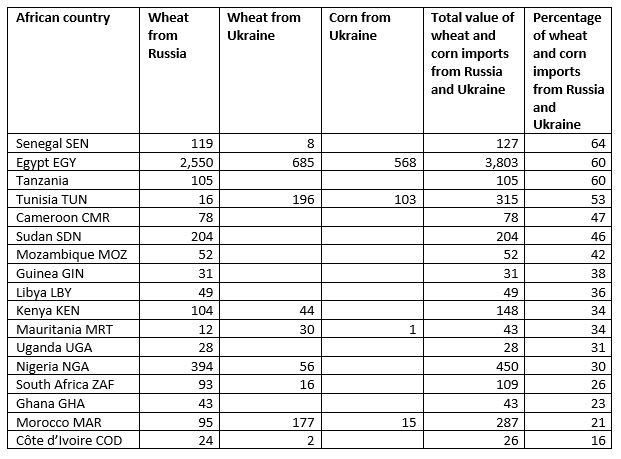Collateral damage of the current Russian aggression in Ukraine


Ton Dietz is Emeritus Professor of the Study of African Development at Leiden University,
and a former director of the ASCL.
Soon after the start of the Russian invasion in Ukraine, warnings have been shared about the collateral damage that could soon follow in terms of disturbed food markets, particularly in Africa. A number of African countries have become major importers of wheat and corn from Russia and Ukraine (see e.g. this article in African Arguments). At the moment of writing this blog (5/3/2022) the world market prices for wheat have already increased 18% in a week, and one may fear that more food price increases may follow, or maybe even the collapse of food trade from both Russia and Ukraine, leaving receiving countries (in Africa and elsewhere) in a very vulnerable position. If this results in hunger, food riots, and other disturbances, Putin will be accountable for more crises. One country in particular is in danger: Egypt, as we already highlighted in an ASCL thematic map about Africa’s international trade 2001-2016 that was published online in 2017.
Grain exports
Let us see what the recent evidence is of grain exports from Russia and Ukraine to Africa. I use the data of the Observatory of Economic Complexity (OEC) for Russia and Ukraine. One can look at previous years, but here it is sufficient to show the data for 2019. Russia exported for US$ 8,140 million wheat to the world, $ 633 million corn and $ 765 million barley. For Africa, wheat is most important, hardly any corn was exported to Africa, and for barley only Libya was a major recipient ($ 48 million), so I will restrict myself to wheat from Russia. Ukraine is a different story: in total, Ukraine exported for $ 4,770 of corn and for $ 3,110 billion of wheat, and African countries were important recipients for both types of grain.
Here is an overview of the most important recipient countries in 2019, in million US dollars, organised in the order of food import dependency on Russia and Ukraine:

Source: OEC data; go to https://oec.world/en/profile/country/xxx and add the first three letters of a country.
Dangerous dependencies
The overview shows that, in 2019, Egypt was by far the most important African importer of wheat and corn from Russia and Ukraine, followed by Nigeria, Tunisia, Morocco and Sudan. In terms of import dependence, four countries in Africa had become dependent on Russia and/or Ukraine for more than 50% of their wheat and corn imports: Senegal for 64%, Egypt and Tanzania for 60%, and Tunisia for 53%. And an additional three countries (Cameroon, Sudan, and Mozambique) for more than 40%. These are very dangerous dependencies in the current predicament, both in terms of food security and in terms of economic and political stability. The internal political stability of many African countries depends on food price stability and often these food prices are being subsidised by governments, which cannot afford major price increases of wheat and corn on the world market for food. In the past, food riots created chaos and regime change (think about the “Arab Spring” in northern Africa). In the near future this may happen again. And then it may happen in countries that already struggle with insurgencies (e.g., Mozambique, Cameroon).
Of course, our thoughts are most with the people of Ukraine, and with those in Russia (including many scientists) who oppose this brutal war. And we are sad about the way African refugees from Ukraine are being treated. However, as Africanists we should also be worried about collateral damage in Africa and what this can mean for the governments and people in Africa, and for Europe as a result of what may happen next.
Would you like to stay updated on new blog posts in the ASCL Africanist Blog? Subscribe here! Would you like to comment? Please do! The ASCL reserves the right to edit, shorten or reject submitted comments.
Recommended reading: blog by Assem Abu Hatab, senior researcher at the Nordic Africa Institute.
Photo derived from Egypt Today.


Add new comment